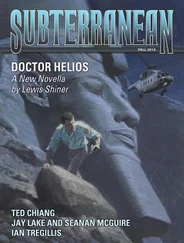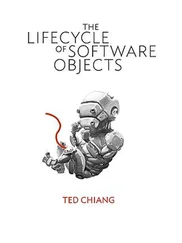· · ·
Nat expected that Morrow would be satisfied for a while given the success of his plan with Mrs. Oehlsen. The woman had transferred some money into a dummy account a couple weeks ago, and her parallel self had bought the story about confusion from the pain meds. Now that Mrs. Oehlsen had passed away, everything was wrapped up tidily. But instead of being content with that, Morrow now seemed more eager than ever for a bigger score.
They were in the office at SelfTalk eating tacos that Morrow had brought from a food truck two blocks away when he raised the topic. “Where are we with Lyle?” he asked.
“I’m making progress,” said Nat. “I can tell he’s thinking that he’d be happier without a prism.”
Morrow finished his taco and drained his can of soda. “We can’t just sit around waiting for him to decide to give up his prism.”
Nat frowned at him. “‘Just sit around’? You think that’s what I’ve been doing?”
He waved a hand at her. “Take it easy, I didn’t mean anything by it. But it’s no good for us if he hangs on to that prism for years. We need to make him want to get rid of it.”
“I know, and that’s exactly what I’ve been working on.”
“I was thinking about something more concrete.”
“Like what?”
“I know a guy, he works with a crew doing identity theft. I could ask him to target Lyle, ruin his credit. After that, Lyle really won’t want to hear about how well his paraself is doing.”
Nat grimaced. “Is that the sort of thing we’re doing now?”
He shrugged. “If there were a way to make Lyle’s parallel life look better, I’d be fine with that, but that’s not an option. The only thing we can do is make his life here look worse.”
A plea based on squeamishness wouldn’t sway Morrow; she needed a more pragmatic argument. “You don’t want to make him so miserable that he holds on to the prism as his only connection to a happy life.”
That seemed to work. “You’ve got a point there,” he admitted.
“Give me a few more meetings before you do that.”
Morrow crumpled up his paper food tray and empty soda can and tossed them into the wastebasket. “All right, we’ll try it your way for a while longer. But you’ve got to speed things up.”
She nodded. “I have an idea.”
· · ·
Dana was a little surprised when Nat announced to the group that she had sold her prism; in previous meetings she hadn’t gotten the feeling that Nat was ready to make the leap, although she knew it wasn’t always possible to anticipate these things. Nat seemed to be happy with her decision, but that was typical; everyone felt good when they first quit. She did notice that Nat very subtly checked Lyle’s reaction to her announcement, something that Dana had seen her doing before. It didn’t appear that Nat’s interest was romantic, or if it was, she wasn’t pursuing it, maybe so as to not complicate things while she worked on her own issues.
At the next meeting Nat talked for longer than usual, describing the ways she felt her attitude had improved since giving up the prism. While she wasn’t overly effusive, Dana was a little concerned that she might have unrealistic expectations and was setting herself up for a fall. Kevin expressed a similar sentiment, somewhat indelicately, and he seemed to be motivated more by envy than compassion; he’d been in the group much longer than Nat, and in all that time had made only modest progress. Fortunately, Nat didn’t become defensive; she said that she understood that getting rid of her prism hadn’t magically solved all the problems in her life. Then the group spent the rest of the meeting focusing on Kevin and what he’d been going through in the last week, without Dana having to steer them at all.
She was feeling pretty pleased about both the group and herself afterward, but her good mood didn’t last long. She had just taken the coffeemaker back to the church kitchen and was locking up the meeting room when Vinessa showed up.
“Hey Dana.”
“Vinessa? What are you doing here?”
“I looked for you at your office,” Vinessa explained, “but you weren’t there, so I figured I’d try here.”
“What’s up?”
“It’s about the money.”
Of course it was; Vinessa had decided to go back to school and had asked Dana for help with the tuition. “What about it?”
“I need it now. The enrollment period is closing this week.”
“This week? The last time we talked about this, you were saying this fall.”
“Yeah, I know, but I decided that the sooner I started, the better. So can you get me the money this week?”
Dana hesitated, thinking about how she would have to rearrange her budget.
“Are you changing your mind?”
“No—”
“Because I took you at your word before, and I made plans based on that. But if you’re changing your mind, say so.”
“No, no, I can get it to you. I’ll send it to you tomorrow, okay?”
“Great, thanks. You won’t be sorry, I promise. I’m going to make it work this time.”
“I know you will.”
The two of them stood there awkwardly for a moment, and then Vinessa left. As Dana watched her walk away, she wondered what was the right word to describe their relationship.
Back in high school they’d been best friends. They spent all their time together, confided in each other, reduced each other to tears laughing. More than that, Dana had admired the way Vinessa didn’t care what anyone thought, how she refused to be boxed in; she got good grades because it was easy for her, and then openly mocked the teachers until they had no choice but to give her detention. Sometimes Dana wished she could have been as brave, but she was too comfortable with the role of teacher’s pet to do anything that might jeopardize that.
Then came the field trip to Washington, D.C. The two of them had planned to host a party in their hotel room for their last evening in the city, but there was the problem of what to do if a teacher knocked on the door: alcohol was too hard to hide, marijuana too easy to smell. Instead they collected Vicodin from their parents’ medicine cabinets, leftovers from Dana’s father’s gum surgery and Vinessa’s mother’s hysterectomy, enough for them and their friends.
What they hadn’t counted on was that one of the teachers had borrowed a key card from housekeeping to do surprise room checks. The very first night, Ms. Archer came in just as the two of them were recounting their stash, two dozen pills arranged in neat rows across the top of the dresser.
“What in the world is going on here?”
They both stood there for a long moment, mute as statues. Dana could see all her future plans evaporating like morning mist.
“Neither of you have anything to say?”
That was when she said it. “They’re Vinessa’s.”
And Vinessa looked at her, more shocked than anything else. She could have denied it, but they both knew it wouldn’t change anything, that Dana would be believed and Vinessa wouldn’t. There was a moment when Dana could have taken back what she said, when she could have confessed the truth, but she didn’t.
Vinessa was suspended. When she returned to school, she pointedly ignored Dana, for which Dana could hardly blame her, but that wasn’t the end of it. Angry at the world, she began acting out: shoplifting, staying out all night, coming to school drunk or stoned, and hanging out with kids who did the same. Her grades plummeted, and her chances of getting into a good college vanished. It was as if, before that night, Vinessa had been balanced on a knife’s edge; she could have become either what society considered a good girl or a bad girl. Dana’s lie had pushed her off the edge, onto the side of being bad, and with that label the course of Vinessa’s life had taken a different direction.
Читать дальше









